The 2020 Browser Battle: Surfing With Speed
by Brett Howse on September 10, 2020 8:00 AM EST- Posted in
- Software
- Browsers
- Mozilla
- Google Chrome
- Microsoft Edge
Scripting Performance
As websites have gotten more and more complex, the browser’s scripting performance has continued to be extremely important. To quantitatively analyze this performance, we turn to several web-based scripting tests. The specific tests we normally leverage are being expanded to include a wider variety of workloads to get a better handle on how each browser can handle them. And, just for fun, we are including some incredibly old scripting tests just to show why they are not used any longer.
As far as hardware we are turning to the Microsoft Surface Laptop 3, featuring the Intel Core i7-1065G7 which is based on Intel’s 10 nm Ice Lake platform. It is set to run in its maximum performance mode during these tests to give the CPU its maximum boost.
WebXPRT 3
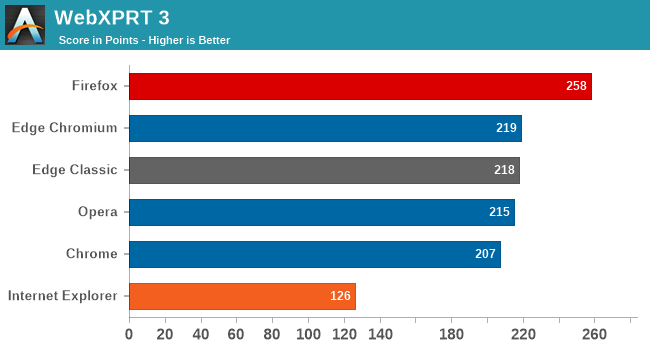
Rather than focus on a specific function, Principled Tehcnologies developed WebXPRT to simulate several real-world tasks with HTML5 and JavaScript, including photo enhancement, OCR scanning, AI, and more. If you would like to delve into how this benchmark works, and how the score is calculated, check out the report on WebXPRT as well as scoring.
In this first test, Firefox is the clear winner, easily outclassing all of the Chromium browsers which are all within a few points of each other. Interestingly, classic Edge and new Edge are almost tied. Internet Explorer does not fare as well.
Speedometer 2.0
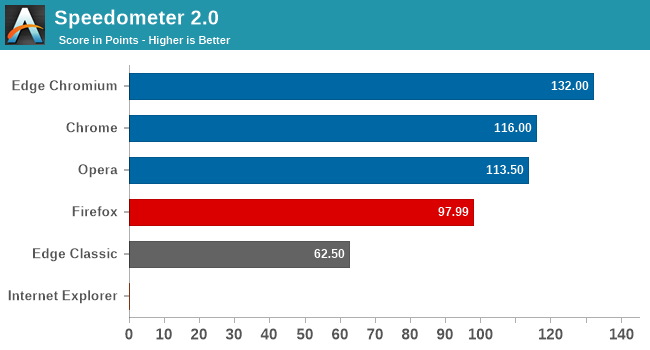
Created by Apple’s WebKit team, Speedometer 2.0 is a relatively simple test which involves adding, completing, and removing items in a to-do list. Speedometer 2.0 was created to measure the browser responsiveness. The test performs the to-do tasks with some of the most popular JavaScript frameworks available, and the score is a geometric mean of the different implementations of the to-do app, and then an arithmetic mean of the geometric means for each iteration. Apple warns against comparing the scores of different browser engines as they will do different work, which is why we use the same browser in hardware reviews.
For this test with different browsers, the scores are actually fairly similar for most browsers, although classic Edge and Internet Explorer both do poorly, with the latter not even loading the page. Interestingly, Chromium Edge does outperform the other Chromium browsers by a few points here.
JetStream 2
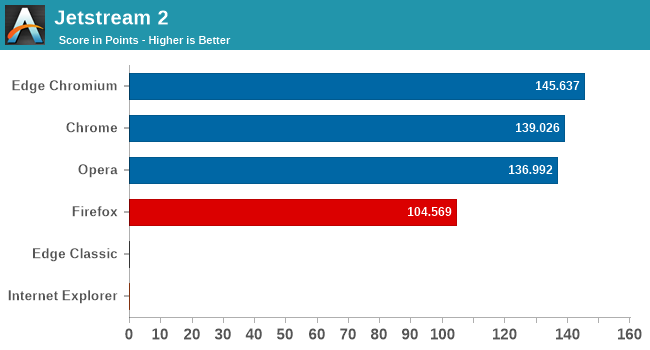
Combining JavaScript and Web Assembly benchmarks, and featuring 64 subtests, JetStream 2 includes part of some older popular scripting tests such as SunSpider and Octane 2, and each benchmark is weighed equally in the results with a geometric mean over each individual benchmark score to provide the final JetStream 2 score.
Again, we see Microsoft’s Chromium Edge slightly edge (pun intended) the other Chromium browsers. Mozilla Firefox is not quite as fast here as the Chromium browsers, and classic Edge and Internet Explorer both failed to load the test at all.
Octane 2.0
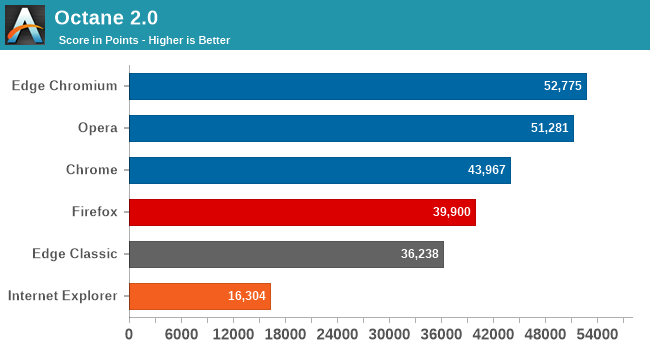
The original Octane was released in 2012, and the later Octane 2.0 was one of the most popular scripting performance benchmarks around. It focused on peak scripting performance, and as is the case, over time browser scripting engines had optimized their code to solve many of the bottlenecks that Octane was originally designed to put a spotlight on, and as such, the benchmark was retired by Google in 2017. New bottlenecks that were not being represented in Octane were common in popular sites, and this is a typical scenario with all benchmarks, but the web moves at a rapid pace.
Here we see some wide variation in results, with Chromium Edge again at the top of the stack, followed closely by Opera, and of course both are based on Chromium, but Google Chrome was not as performant on this test. All of the Chromium browsers did outperform all other browser though, with Firefox slightly behind Chrome here. Classic Edge was a bit further back, and of course Internet Explorer with its very outdated scripting engine was far behind the rest, although at least this test did run in IE 11.
Kraken 1.1
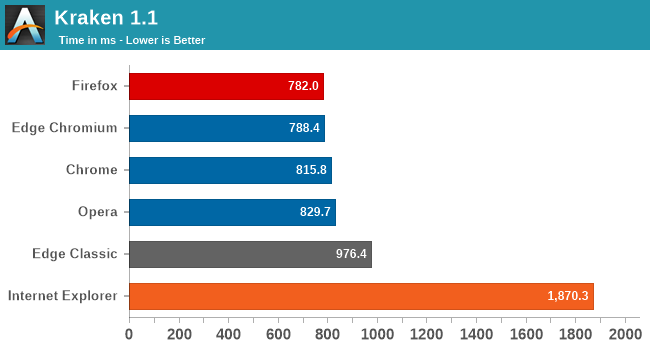
Created by Mozilla, Kraken runs several test cases from real-world applications and libraries, and includes 14 subtests. Results are reported in milliseconds to complete the tests, and as it is time-based, lower results are better.
Mozilla Firefox is our fastest browser in this test, although only by a hair. Again we see Microsoft’s implementation of Chromium Edge outperform the other Chromium browsers, although all of them are in the same range of results. Classic Edge takes a definite step back in performance here, and Internet Explorer trails the pack by a wide margin.
SunSpider 1.0.2
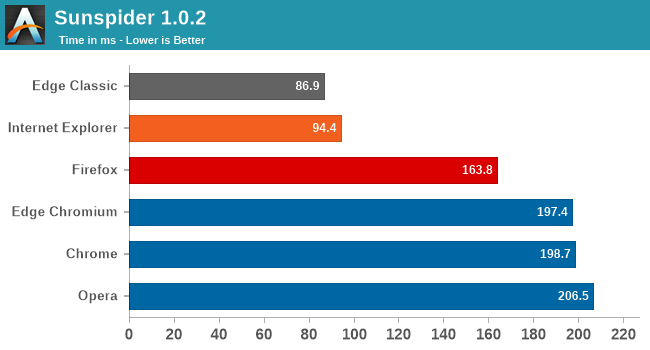
The last version of SunSpider was 1.0.2. Once this was likely the most popular scripting test around, and likely due to that, developers optimized their code to quickly overcome this test, and then found ways to work around it. SunSpider was retired and is no longer a relevant test, but since it is not too difficult to run, it was added just to see how modern browsers perform on it.
Interestingly Internet Explorer, and the newer browser based off of its code, classic Edge using EdgeHTML, both perform suspiciously high on this now retired benchmark. Whether that is due to Microsoft’s Chakra scripting engine still containing “optimizations” for SunSpider is somewhat irrelevant, as not only has the benchmark been retired, but both Internet Explorer and classic Edge are both also defunct as well.
Summary
With so many browser makers now using Chromium as their base, and contributing to its code, it should not be a huge surprise to see the Chromium browsers offering the highest scores here. Firefox does very well though, only a couple of points behind. Classic Edge, which has not been developed for over a year, is still quite compatible, but poor Internet Explorer is way behind the rest.


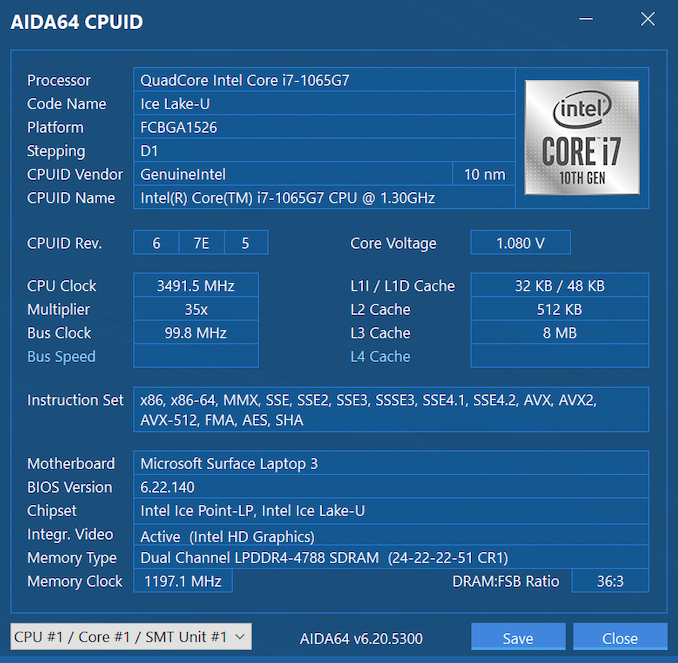








121 Comments
View All Comments
Tilmitt - Monday, September 14, 2020 - link
Just defected to Edge. Google's moat is breached.edzieba - Monday, September 14, 2020 - link
I'll be over in the corner with the weirdos using Palemoon.XUL LIVES!
IGnatius T Foobar - Monday, September 14, 2020 - link
Brave and Dissenter are Chromium forks which provide all of the Chrome browsing experience with none of the Google. That's a fantastic value proposition, especially when combined with DuckDuckGo for search.zeeBomb - Monday, September 14, 2020 - link
browser battles in 2020? who would’ve thought!GTVic - Monday, September 14, 2020 - link
I recommend Browser Chooser 2. Lets you pick the best browser for each link.martixy - Tuesday, September 15, 2020 - link
I feel it's mostly about feature set at this point.I use FF on mobile because it supports extensions better, I use chrome on desktop because it supports extensions better.
reheri - Tuesday, September 15, 2020 - link
𝐒𝐭𝐚𝐫𝐭 𝐰𝐨𝐫𝐤𝐢𝐧𝐠 𝐚𝐭 𝐡𝐨𝐦𝐞 𝐰𝐢𝐭𝐡 𝐆𝐨𝐨𝐠𝐥𝐞! 𝐈𝐭’𝐬 𝐛𝐲-𝐟𝐚𝐫 𝐭𝐡𝐞 𝐛𝐞𝐬𝐭 𝐣𝐨𝐛 𝐈’𝐯𝐞 𝐡𝐚𝐝.𝐋𝐚𝐬𝐭 𝐖𝐞𝐝𝐧𝐞𝐬𝐝𝐚𝐲 𝐈 𝐠𝐨𝐭 𝐚 𝐛𝐫𝐚𝐧𝐝 𝐧𝐞𝐰 𝐁𝐌𝐖 𝐬𝐢𝐧𝐜𝐞 𝐠𝐞𝐭𝐭𝐢𝐧𝐠 𝐚 𝐜𝐡𝐞𝐜𝐤 𝐟𝐨𝐫 $𝟔𝟒𝟕𝟒.𝐭𝐡𝐢𝐬 - 𝟒 𝐰𝐞𝐞𝐤𝐬 𝐩𝐚𝐬𝐭. 𝐈 𝐛𝐞𝐠𝐚𝐧 𝐭𝐡𝐢𝐬 𝟖-𝐦𝐨𝐧𝐭𝐡𝐬 𝐚𝐠𝐨 𝐚𝐧𝐝 𝐢𝐦𝐦𝐞𝐝𝐢𝐚𝐭𝐞𝐥𝐲 𝐰𝐚𝐬.𝐛𝐫𝐢𝐧𝐠𝐢𝐧𝐠 𝐡𝐨𝐦𝐞 𝐚𝐭 𝐥𝐞𝐚𝐬𝐭 $𝟏𝟕𝟕 𝐩𝐞𝐫 𝐡𝐨𝐮𝐫. 𝐈 𝐰𝐨𝐫𝐤 𝐭𝐡𝐫𝐨𝐮𝐠𝐡 𝐭𝐡𝐢𝐬 𝐥𝐢𝐧𝐤 COPY THIS SITE and see video............... cutt.ly/UflNJc9DominionSeraph - Wednesday, September 16, 2020 - link
Edge's translation seems to suck compared to Chrome, and THEY SWITCH THE ORDER OF JAPANESE NAMES.No no no no no no no no no no no no no no no no no no.
Gastec - Friday, September 18, 2020 - link
I have 600 Mbps internet connection and in Firefox it only goes to 400-420 Mbps on all online speed tests, while on Chrome it reaches full 600 Mbps. Maybe someone can explain to me why?Alien88 - Saturday, September 19, 2020 - link
I used to use firefox but the UI changes were driving me nuts, switched to Opera years back. It has inbuilt mouse gestures, you can install any chrome extension (it's based on chrome), it has an inbuilt VPN, and it all just works. It may be owned by the chinese (not sure if that's the case) but who cares, they datamine constantly anyway, if you think they don't have your data, you are kidding yourself.